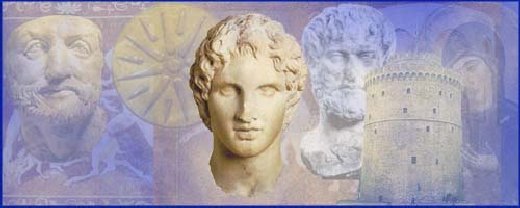
by Hope Nelson
In 334 BCE, the confident young king of Macedonia and Greece was about to fulfill part of his father's plan. He had just defeated the Greek City of Thebes that had revolted against him after his father's death. If he could defeat Thebes, why not Persia as well? Alexander and his army of about 35,000 men had crossed over into Asia Minor and were about to meet the Persians on the banks of the Grancius River. If he got the victory he and his father Philip had dreamed about, the whole of Asia Minor would be open to him for conquest. Thus, at the Battle of Grancius in 344 BCE, began one of the great conquests in history. The Persian Empire of Darius III was doomed. One year later, in 333 BCE, Alexander and his soldiers met an even larger army of 60,000 Persians on the plains of Issus. In this battle, although outnumbered almost two to one, Alexander once again led his Greek army to victory over Persian forces. It was the beginning of one of the most amazing careers in history and would make Alexander the Great one of the greatest conquerors in history.
 Alexander talking to a conquered prince. |
Next the band of soldiers, led by their victorious king, went into Phoenicia and fought the City of Tyre. This victory is often thought of as one of his greatest military achievements, but this battle led to 8,000 slain Tyrains, with 30,000 more sold into slavery, and a lot of broken hearts. After learning of this battle, most of the cities in Palestine and Philista (except Gaza) gave into him, probably from fear of destruction and death. Gaza was later conquered and suffered a fate much like that of Tyre.
Traveling next into Egypt, the Greeks were welcomed with relief by the Egyptians, who had been under the strict and harsh rule of the Persians, until Alexander conquered them. The Egyptians made him their pharaoh, and he founded the town of Alexandria by the mouth of the Nile River. While in Egypt, he visited a temple of Amon where he was told he was going to conquer the world.
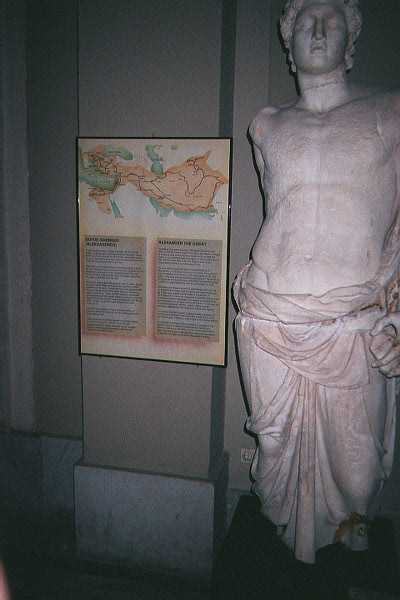 A full figure statue of Alexander |
When Darius collected another army of more than a million men, Alexander turned around to fight him again. He defeated them on the plains of Arbela. He then went to fight the City of Babylon, which surrendered to him. When the cities of Susa and Persepolis surrendered to Alexander and gave him treasures of gold and silver he would spared them. But cities that resisted him had all their people either killed or sold into slavery.
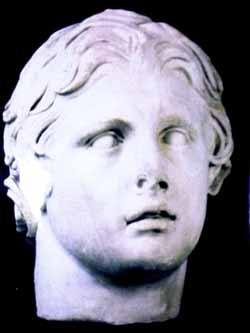 A bust of Alexander |
Although Darius had escaped at the battle at Arbela, he was later murdered by one of his own generals. After this, Persia was under the rule of Alexander. But he and his army went farther out and conquered many other places, such as tribes that lived by the edge of the Caspian Sea. He also founded many other cities that were named after him. At Sogdiana, another city he conquered, he lost his temper and killed his life long friend, Clitus. He may have been a great conqueror, but he couldn't even control his own temper.
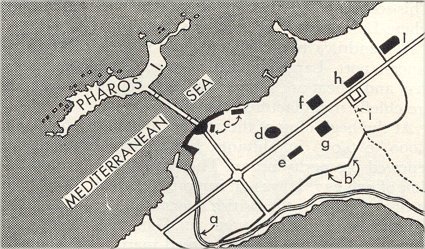 The harbor of the ancient City of Alexandria |
At the peak of his rule, his empire stretched from the Ionian Sea to the northern part of India. He wanted to make Asia and Europe all one large country and have Babylon be its capital. He married an Asian woman to try and unite all his new people. Ten thousand of his soldiers also married Persian women. The Persians were trained to do service in Alexander's armies.
Although he may not have quite conquered the whole world, he did conquer a large portion of the known ancient world, like he had dreamed of doing. Others that followed him never came as close as he did to being "Ruler of the World." When he died, he was buried in a big, beautiful tomb in Alexandria. The vast empire he had fought almost his whole life was divided among many rulers. But he is still spoken of, as the one and only "Alexander the Great."
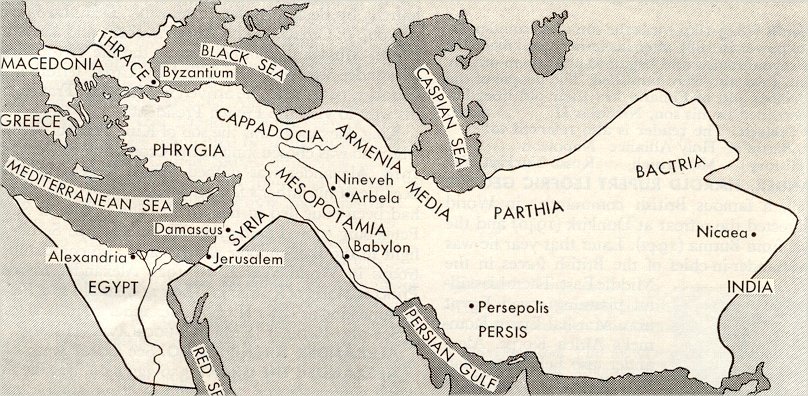 Alexander's large empire |
|
Sources: |
Badian, E. Alexander the Great, King of Macedonia. |
|
"Alexander the Great" Grolier Multimedia Encyclopedia CD-ROM, Grolier Electronic Publishing, Inc. 1996. |
|
|
"Alexander the Great." World Book Encyclopedia, 8th edition. Volume 1. Field Enterprises, Inc. 1955. |
|
|
"Alexander the Great Web Site" at: http://www.entergroupltd.com/alex_web/, visited 12/1/1999 |
|
|
"Alexander the Great." Messengers of Light Web Site at: http://sangha.net/messengers/alex.html, visited 12/1/1999 |